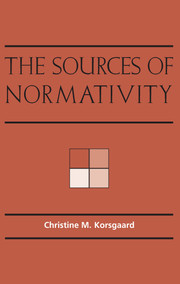Book contents
- Frontmatter
- Contents
- Notes on the contributors
- Acknowledgments
- Introduction
- Prologue: Excellence and obligation a very concise history of western metaphysics 387 bc to 1887 ad
- 1 The normative question
- 2 Reflective endorsement
- 3 The authority of reflection
- 4 The origin of value and the scope of obligation
- 5 Reason, humanity, and the moral law
- 6 Morality and identity
- 7 Universality and the reflective self
- 8 History, morality, and the test of reflection
- 9 Reply
- Bibliography
- Index
Prologue: Excellence and obligation a very concise history of western metaphysics 387 bc to 1887 ad
Published online by Cambridge University Press: 20 May 2010
- Frontmatter
- Contents
- Notes on the contributors
- Acknowledgments
- Introduction
- Prologue: Excellence and obligation a very concise history of western metaphysics 387 bc to 1887 ad
- 1 The normative question
- 2 Reflective endorsement
- 3 The authority of reflection
- 4 The origin of value and the scope of obligation
- 5 Reason, humanity, and the moral law
- 6 Morality and identity
- 7 Universality and the reflective self
- 8 History, morality, and the test of reflection
- 9 Reply
- Bibliography
- Index
Summary
One should guard against thinking lightly of [the bad conscience] merely on account of its initial painfulness and ugliness. For fundamentally it is the same active force that is at work on a grander scale in those artists of violence and organizers who build states … only here the material upon which the form-giving and ravishing nature of this force vents itself is man himself, his whole ancient animal self … This secret self-ravishment, this artists' cruelty, this delight in imposing a form upon oneself as a hard, recalcitrant, suffering material and of burning in a will … as the womb of all ideal and imaginative phenomena, also brought to light an abundance of strange new beauty and affirmation.
NietzscheIt is the most striking fact about human life that we have values. We think of ways that things could be better, more perfect, and so of course different, than they are; and of ways that we ourselves could be better, more perfect, and so of course different, than we are. Why should this be so? Where do we get these ideas that outstrip the world we experience and seem to call it into question, to render judgment on it, to say that it does not measure up, that it is not what it ought to be? Clearly we do not get them from experience, at least not by any simple route. And it is puzzling too that these ideas of a world different from our own call out to us, telling us that things should be like them rather than the way they are, and that we should make them so.
- Type
- Chapter
- Information
- The Sources of Normativity , pp. 1 - 6Publisher: Cambridge University PressPrint publication year: 1996

